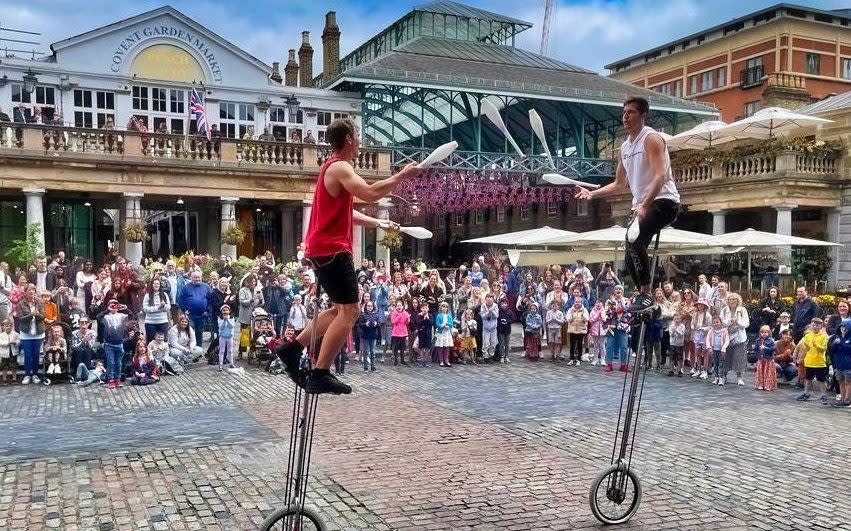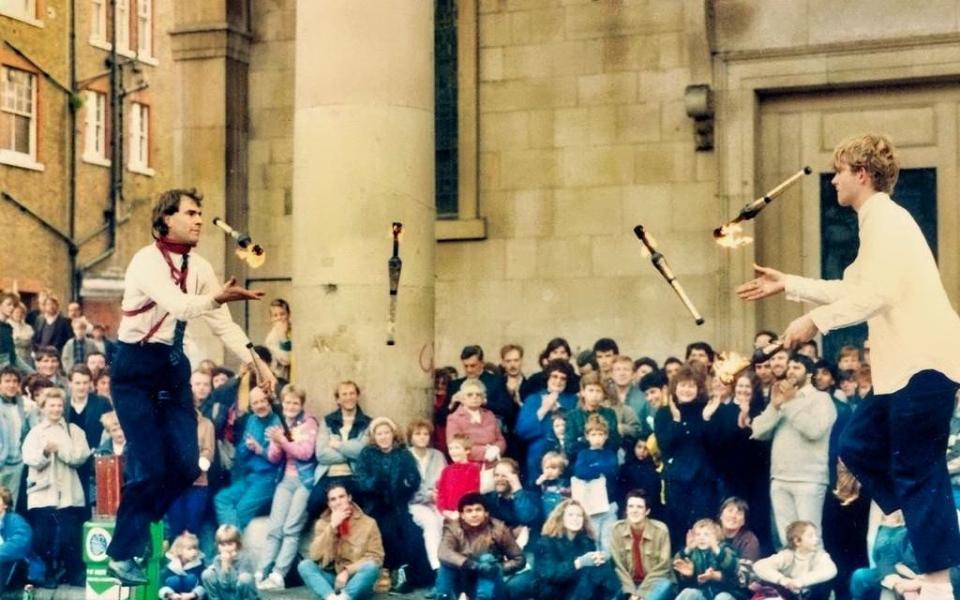It’s curtains for Covent Garden street performers under council plans

Street performers in Covent Garden have warned they may be turfed out by Christmas under the city council’s plans to reduce noise.
The Covent Garden Street Performers Association (CGSPA) has urged Westminster City Council to reverse what it calls a “draconian” licensing agreement that prevents performers from operating freely in the popular West End hub.
The group has warned that a council vote on Dec 4 could prevent them busking and performing in the central piazza opposite St Paul’s church, which has been a traditional place of street performance for hundreds of years.
The CGSPA, made up of about 30 performers, insisted that the original scope of the licence being voted on “amounts to sheer cultural vandalism of a beloved and quintessentially British artistic institution”.
The licence, initially introduced in April 2021, aims to regulate busking and street entertainment across 26 areas in London and was billed as a way to “protect residents and businesses from excessive noise and overcrowding”.
The restrictions for magicians, buskers, jugglers, clowns and others included no naked flames, knives or sharp objects, trip hazards, generator-powered amplifiers or “nuisance” to people in nearby properties during performances.

Some of the key areas affected under this new umbrella of rules were Oxford Street, Piccadilly, Leicester Square, Soho and Covent Garden.
Artists who began their careers by performing outside the church in Covent Garden were among the first to rally against the introduction of the policy, including comedian Eddie Izzard.
Izzard told The Telegraph: “Westminster Council would be making a grave mistake if they followed officers recommendations and made street performing in London a criminal offence on 99.9 per cent of the area that they license.
“Street performing in London is a vital part of the tourism and cultural offer... Such harsh restrictions would make it impossible for current street performers to earn a living, in a way they have been doing since Samuel Pepys first documented a Punch & Judy show in London’s West End back in 1662. This would also have a negative impact on the world renowned Covent Garden experience.
“As the first elected leader of the Street Performers’ Association, I believe Westminster Council should be working with street performers, rather than working against them and criminalising their entrepreneurial work and craft.”
The CGSPA has now warned that the council plans to use the vote to approve new resources and powers to enforce the licence, something they have yet to do in the Covent Garden area.
Representatives from Westminster City Council, meanwhile, have told The Telegraph they will only consider making “small changes” to the policy at the December meeting, which do not amount to a “ban on busking”.
CGSPA members Melvyn Altwarg and Peter Kolofsky said: “Performers don’t want to always be looking over their shoulders. They do not want to have been criminalised and they do not want the death of Covent Garden street theatre.”

The group added that the stated objective of the policy – to reduce noise complaints in the affected areas – has proven “ineffective,” particularly in Leicester Square.
Mr Altwarg and Mr Kolofsky said: “Since 2021 the scheme across the whole of Westminster has proven vastly ineffective.
“It was ostensibly brought in to reduce noise in the borough but we have not agreed to licences and have had very few complaints in Covent Garden.
“In Leicester Square where performers have taken up licences the noise problem has become considerably worse – the licences in Leicester Square have actually given rise to more noise complaints, not less.”
In a review of the scheme published last June, Westminster City Council said it had received 5,070 complaints relating to street buskers from April 2021 to May 2023 – far above the 2,200 yearly average – with over 50 per cent of those relating to noise.
Of the complaints received, the council noted that only around five per cent (305) came from within Covent Garden, which has a population of more than 6,000 people, including many families.
Mr Kolofsky said that if they went ahead and banned “dangerous props” such as knives, naked flame and pyrotechnics, then “that would be the end of the line for me as a street performer”.
‘Reject voices of gentrification’
The CGSPA has requested that Covent Garden be removed from the affected licensing areas under Westminster City Council, arguing that they already regulate the area well for performers.
The group is understood to not want to follow the “performing chaotic regulatory demise” seen in Leicester Square under the same licensing agreement.
A petition launched by Equity, a union of more than 47,000 performers and creative practitioners, has already garnered over 5,000 signatures to “Save Covent Garden Street Performers” by urging the council to reconsider.
Launched by Gareth Forest, campaigner for Equity, it states: “A vote for licensing will see the colour and vibrancy of magicians, musicians, jugglers, clowns, artists and players swept away and replaced by empty gentrified, sanitised high streets in Covent Garden.
“The reality is that most performers will be pushed out of the city centre as a result of licensing.”
He adds that they are calling on the councillors to “reject the voices of gentrification” and “revoke the heavy handed and unnecessary” licensing conditions in the West End shopping and entertainment hub.
Councillor Aicha Less, deputy leader and cabinet member for communities, public protection and licensing for Westminster City Council, said that there is no ban on busking in Westminster.
“We are not looking to introduce a ban on street performers and never have done,” she told The Telegraph, adding: “Buskers and street entertainers are a vibrant part of our city’s culture and a popular attraction for visitors throughout the city.
“The committee meeting on the 4th December will be an opportunity for the council to consider making small changes to the current busking and street entertainment policy.
“It is important to strike a balance so that residents and businesses are not impacted with noisy performances or large crowds causing disruption.”

 Yahoo News
Yahoo News 
